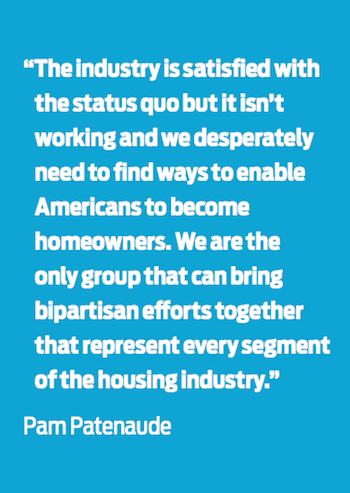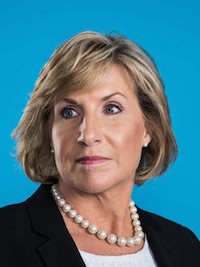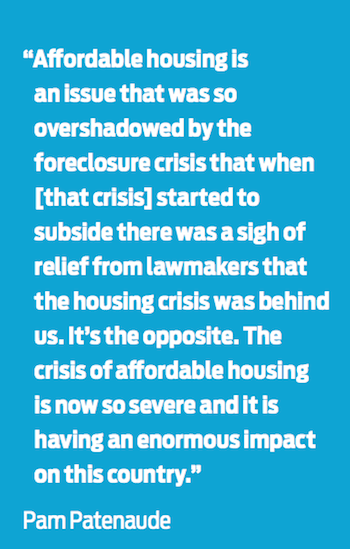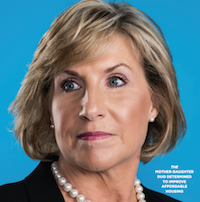#div-oas-ad-article1, #div-oas-ad-article2, #div-oas-ad-article3 {display: none;}
Pamela and Meghan Patenaude breeze into the swank restaurant Knife for lunch near Southern Methodist University in Dallas. They popped in to big D to cement the location of one of their many high-profile housing events.
They’ve secured the George W. Bush Institute, and it’s about as fitting as a location can get for exactly what this mother and daughter team do, day in and day out.
Both women are wearing white and sit on opposite ends of the table. Pamela slides a draft copy of the event’s marketing material over the top of the varnished wood table. She orders avocado fries for “her friends at the table.” She is trying to soften the coming blow, but her direct demeanor fails in this regard: “America is in the midst of the worst housing crisis I have seen in my 45 years in the homebuilding industry,” reads the very first sentence of the brochure.
Its author is both Pam and Meghan’s boss. That man is J. Ronald Terwilliger and the Patenaudes are taking the message of his nonprofit, Housing America’s Families, to every mover and shaker in the housing, mortgage and political space.
“I met with a wealthy mortgage lender last week,” Pamela opens, “and he said ‘Affordability is at the highest levels I have seen, so what’s the problem?’”
“The problem is, he doesn’t get it,” Pamela said. Meghan is quick to add, “We’ll get him to get it.” The exchange is subtle, but also says a lot.
Pamela and Meghan Patenaude run the day-to-day operations of the J. Ron Terwilliger Foundation for Housing America’s Families. Their goal is to educate Congress about the need for a strong, clear housing policy to be executed in the next presidential administration.
Aside from wearing white, the two don’t have much in common, except that they are both allergic to onions, as the Knife wait staff soon hears. (Meghan’s burger still came with onions, but she took it in stride.)
Taken separately, both women are impressive, accomplished individuals. Together, they are formidable. If you want in on their show, it starts at $5k and goes all the way to $25k.
That’s the cost of participating in the sponsorship opportunities at the nation’s premier national housing policy event on November 18: the Housing America’s Families Forum, which will be held at the George W. Bush Institute and represents the might of the Patenaudes.
During that one-day event, expert speakers will discuss the issues facing affordable housing in America. The aim is to develop a concrete plan to guide the decisions of the new presidential administration and the 115th Congress.
It’s obviously a political issue that needs a political solution, and the Patenaudes already have some seriously smart and powerful people attending the event: the mayors of Dallas and San Antonio will speak about their experiences with housing in their respective cities. Representatives from HousingWire will be there, as well as the Wall Street Journal and the Independent Review. Economists from CoreLogic and Redfin will speak as well. The National Association of Home Builders, the Urban Institute, and the names continue to pile in.
This isn’t their only event this year. The JRTF will also host a party at the Republican National Convention in Cleveland featuring Texas BBQ and live music from the band Big and Rich. As with the George W. Bush event, this concert will be limited in attendance. The Patenaudes like to keep it controllable; there needs to be an opportunity to speak, and to listen.
The Patenaudes finish their lunch, and the pitch to get more people behind them. The extent to which they live and breathe affordable housing animates their speaking. Pamela mentions she just finished reading Evicted: Poverty and Profit in the American City by Matthew Desmond. The book tracks the real lives of eight families on the edge of society, who struggle to maintain stable housing for their families. “Would you like to read it?” Pam asks. “I can send you a copy.” True to her word, the copy arrives one week later.

 They also talk about another meal: the breakfast at the event at the George W. Bush Institute.
They also talk about another meal: the breakfast at the event at the George W. Bush Institute.
Right now they haven’t decided who will give the keynote. It will likely be one of three people, Pam says. Those choices include Paul Ryan, the Speaker of the House, Kevin Brady, chair of Ways and Means or Jeb Hensarling, chair of the House Financial Services Committee. Being spoiled for those choices is not bad for a foundation only two years old.
The Patenaudes leave it there. Their flight out of Dallas leaves in a few hours and they want to be sure to have time to visit the 6th Floor Museum in Dealey Plaza, which presents the life, death and legacy of President John F. Kennedy.
THE PATENAUDE PATH
In late May of 2015, the Financial Services Roundtable sent an email to reporters and editors covering money markets. The FSR is a reasonably large organization and the name carries some weight. FSR member companies provide fuel for America’s economic engine, accounting for $92.7 trillion in managed assets, $1.2 trillion in revenue, and 2.3 million jobs, the trade group claims.
In that email, the FSR media machine outlined its “2016 Presidential Focus Series, an advocacy initiative to highlight consumer issues on which the presidential candidates should focus as they campaign for the Presidency.”
“Presidential candidates should outline for the American people how they will grow the economy, encourage innovation, and modernize our regulatory system to help consumers and protect taxpayers,” said FSR CEO Tim Pawlenty. Pawlenty carries his own level of cache; he served as the 39th Governor of Minnesota, following the tenure of fellow Republican Jesse Ventura.
The FSR email outlined eight points of reform it feels the next president should address, three of those aforementioned by Pawlenty, with the other five including fairly nebulous statements, such as “enhancing financial literacy,” to the more specific, “ensuring a secure retirement for all.”
The only direct housing reform mentioned by the FSR was “ending Fannie & Freddie bailouts,” with a promise of a more-on-that-later type of email coming in the future.
The Patenaudes’ strategy, one could argue, is very different and incredibly more effective. Their path is nothing as simple as a carpet-bombing email stream. Still, the messages could compete: the FSR and every other advocacy group each has its own agenda.
“This is an issue that dozens of advocacy groups out there have taken up, but it is such a fractured environment,” Pam said. “Affordable housing is an issue that was so overshadowed by the foreclosure crisis that when [that crisis] started to subside there was a sigh of relief from lawmakers that that the housing crisis was behind us.
“It’s the opposite. The crisis of affordable housing is now so severe and it is having an enormous impact on this country,” she adds.
#div-oas-ad-article1, #div-oas-ad-article2, #div-oas-ad-article3 {display: none;} While everyone is blasting emails and pasting blogs on websites, the Patenaudes share their message in one-on-one meetings, via direct text and good old cocktail hour chatter.
“When you want something done in Washington, you call Pam,” said David Stevens, the president of the Mortgage Bankers Association. “When Pam needs to get things right, she enlists her daughter Meghan. Together, they are a highly effective team that’s already challenging conventional thinking in our nation’s capital.”
Stevens is a big fan of the way the Patenaudes operate and he rarely effuses such praise publicly.
“The Terwilliger Foundation is one of a kind. It’s a place where folks from different political backgrounds come together around a common goal — to transform our nation’s housing policy to meet the needs of all Americans,” he said.
 “Ron’s passion and commitment are an inspiration to us all,” Stevens said. “In Pam, he has found a great leader for the Foundation and someone who can bring his vision to life.”
“Ron’s passion and commitment are an inspiration to us all,” Stevens said. “In Pam, he has found a great leader for the Foundation and someone who can bring his vision to life.”
Terwilliger agrees that the Patenaudes are vital to the success of his mission.
“In any industry, it is rare to find a mother/daughter duo like Pam and Meghan with such a depth of knowledge and authentic passion for what they do,” Terwilliger said. “The Foundation is very fortunate to have this dynamic team leading the charge for a more effective national housing policy.”
“Pam brings great experience and judgment. Meghan brings energy and focus,” he added. “Together, they are a powerful force for expanding access to affordable housing.”
As for the competing interests of other, more digitally minded advocacy groups, Pam is not worried.
Emails, such as the one from the FSR, she labels as “somewhat opportunistic…But not harmful.”
And after a moment, she adds: “Our Foundation has been strategic and consistent.”
A CONSISTENT HOUSING POLICY
The duo is dealing with the crisis on two levels. The first is getting lower income borrowers access to credit so that they can, one day, become homeowners. The second is access to affordable rental housing.
Here is the JRTF housing policy in three steps. You will not find this on any website, or presented in print or in any format that can be widely shared. The next time you hear this, one of the Patenaudes will be telling it to you or, more likely, it will be during the next State of the Union address.
1. Housing must be singular.
Fair housing initiatives, rental assistance — all the different moving parts are just too fractious, the Patenaudes believe. “Housing policies that are plural will not serve our future generations.” One solid basis for promoting affordable housing and rental opportunities must be implemented to solve the national housing crisis.
2. Get rid of antiquated credit models.
All housing players should use the latest in credit scoring and implement alternative models as well. This is not an unusual call. The government-sponsored enterprises are looking at credit models differently too, even as they themselves continue to rely on outdated credit data-gathering techniques. “If credit availability isn’t truly egalitarian, it doesn’t serve the market,” Pam states.
3. Take housing finance off life support.
“Fannie and Freddie are an enormous issue that cannot be left unresolved,” Pam states. The path from renting to owning needs to be included in the system of housing finance (see point #1). The 115th Congress needs to pass legislation reforming the government-sponsored enterprises and the Patenaudes are pressing for just that.
They are making progress getting these three points into the ears of policy makers. One of the biggest accomplishments for the foundation to date has been to bring more attention to the issue of affordable housing and help the issue emerge from the shadows.
“Our long-term goal is to get legislation entered and passed to be able to put together a comprehensive legislative package for the new administration,” Meghan adds.
As the duo prepares to emerge from what they coined as the “education phase” of their foundation, the next step is to begin with what Pam describes as the “aggressive advocacy” phase. In other words, they want to mount a frontline attack on lawmakers to change policy. “We want to have a housing policy that is in line with the current and future needs of this country,” said Pam.
A big part of the message their foundation is promoting is that rental housing and home ownership are interconnected and can’t be separated. “The first-time homebuyer market depends on renters and if renters are so cost burdened, then that is a barrier to homeownership,” Pam said.
“The industry is satisfied with the status quo but it isn’t working and we desperately need to find ways to enable Americans to become homeowners. We are the only group that can bring bipartisan efforts together that represent every segment of the housing industry.”
It’s a monumental task; changing the hearts and minds of the housing and mortgage finance industry as well as legislators and the entire population of the United States of America. “Even the public thinks the foreclosure crisis is over,” said Meghan. “We will keep housing at the top of the minds of those who matter enough to change this.”
And while Pam still takes most of the spotlight, Meghan is making her mark as well. In the evenings, when not serving as a senior policy analyst for her mother, she attends Georgetown University to earn a degree in Real Estate Finance. It’s a setup the Foundation’s owner could not be more confident in.
“I’ve served three tours of duty with Pam — at the ULI Terwilliger Center for Workforce Housing, the Bipartisan Housing Commission, and now the Foundation. In each of these jobs, Pam has been a wonderful colleague and a real leader. It’s great to see Meghan upholding the Patenaude family’s commitment to affordable housing,” Terwilliger said.
“I like to kid Pam that the apple does not fall far from the tree,” he adds. “Meghan is smart, hard-working, and does not take ‘no’ for an answer.”
And then he offers a quick, but poignant closer: “She’s just like her mother.”






